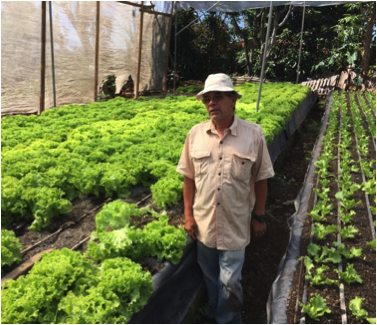WDI Publishing recently released a new case study on the evolution of a global cross sector partnership between Walmart and the United States Agency for International Development (USAID). The case explores the successes, challenges, and lessons learned in the 15-year collaboration between the two organizations.

“Walmart and USAID: The Evolution of a Global Cross-Sector Partnership,” focuses on partnerships that sought to engage smallholder farmers in the developing world, and highlights examples from Honduras, Guatemala, Rwanda and Bangladesh. It explores the ways in which these collaborations came about, how they were supported by the partners, and the level of success achieved as measured by Walmart, the Walmart Foundation, and USAID.
The case also identified lessons learned for the future of the Walmart/USAID collaboration, and insights that may apply to the development of partnerships for development more broadly.
A team of graduate student from the Ross School of Business and the Ford School of Public Policy assisted with researching and writing the case with faculty leadership from WDI Senior Fellow Ted London, and management support from WDI Scaling Impact Research Manager Colm Fay.
“This work explores how Walmart and USAID have sought to build a global alliance based on mutual value creation,” London said. “A key goal of the project was to develop a case that can help the partners themselves understand what had happened over the past 15 years and will help catalyze strategic thinking for both organizations.”
The case is designed for use in graduate, undergraduate, and executive education programs taught in university business schools. It can be used within disciplines, such as public policy, public administration, public health, development studies, natural resources and other domains interested in understanding the opportunities and challenges of building cross-sector collaboration that generates both social impact and business outcomes. The case could also be used by independent training organizations, or for training programs within multinational corporations or public sector organizations, especially those focused on positive global social impact or corporate social responsibility.
The case is available free of charge from WDI Publishing here.
The WDI-run blog site NextBillion also wrote about the case and its development. Read more here.
Ted London, vice president and senior research fellow for WDI’s Scaling Impact Initiative, was recently interviewed about co-creating value with the base of the pyramid (BoP) for an article in the annual magazine of the Dutch-based non-profit organization SNV.

In the interview with Connect magazine, London discusses how the business approaches of the BoP can help alleviate poverty, how non-governmental organizations (NGOs) like SNV can play a role, and what the future is for the BoP. Read the Q&A here.
SNV is an international not-for-profit development organization. Its global team of local and international advisors work with local partners to equip communities, businesses and organizations with the tools, knowledge and connections they need to increase their incomes and gain access to basic services – empowering them to break the cycle of poverty and guide their own development.
More than ever, business and market-based approaches in general are seen as critical parts of the solution to global poverty. Governments, NGOs and businesses – from startups to multinationals – have largely accepted this premise. Now, it is time to start talking more about how we, as a sector, can collectively share – and debate – the lessons learned so far in order to better create the future path ahead of us. But in order to do that, we need to be more of a community. To achieve this, we need a long-term vision not only for specific enterprises, but a shared vision for the domain as a whole.
A new ‘action agenda’ for base of the pyramid businesses presents four key initiatives to guide and enhance development of the domain over the next decade
London’s Base of the Pyramid Impact Assessment Framework explores how ventures influence the well-being of local buyers, sellers, and communities. It guides managers through a detailed look at an organization’s effects on those constituencies in three areas: economics, capabilities, and relationships. The framework examines negative as well as positive effects—for instance, whether activities that increase the income of the poor also prompt them to mistreat arable land. It helps managers focus success measures on the most likely high-magnitude outcomes.
With a goal of better connecting the BoP community to help move the domain forward, the William Davidson Institute organized and hosted the BoP Summit 2013: Creating an Action Agenda for the Next Decade on October 21-23, 2013 at Ross Business School at the University of Michigan. Participants took stock of the current BoP domain, identified success factors and on going challenges, and explored how challenges could be overcome. This document describes the summit design process, and details the outputs of each working group.
In Next Generation Business Strategies for the Base of the Pyramid, Ted London, Stuart L. Hart, and six leading BoP thought and practice leaders show how to apply today’s most significant BoP innovations, techniques, and business models. London, Hart, and their contributors go beyond providing low-cost products and extending distribution reach by demonstrating how to promote market development, innovation, and capability creation “with” BoP new customers, not “at” them. This publication is available through Amazon and Barnes & Noble.
The base of the pyramid (BoP) domain is at an important crossroads. More than ever business, and market-based approaches in general, are seen as part of the solution to global poverty. But substantial challenges remain. Built around a prioritized set of initiatives for the future development of the BoP domain, the BoP Roadmap is intended to be a catalyst to generate a stronger and more robust BoP community.
WDI was contracted by Walmart to develop a case study that focuses on the relationship between Walmart and United States Agency for International Development (USAID) during the period of 2004 – 2014. The grant allowed WDI’s BoP Initiative representatives and a team of four graduate students to closely work with Walmart and USAID to develop a case designed for classroom use. Between January and April, 2015, the case writing team and WDI Staff traveled to Walmart and USAID headquarters to conduct interviews and present their case and findings. The case was published by WDI’s GlobaLens and distributed to universities worldwide, free of charge.
The purpose of this three month project funded by GIZ was to allow the BoP initiative to design a study detailing a current landscape of BoP facilitators focused on the sub-Saharan Africa region. After field visits to Kenya and Ethiopia, WDI team outlined the scope and scale of future engagements including initial data collection protocol and partner set and presented it to partners in Germany.